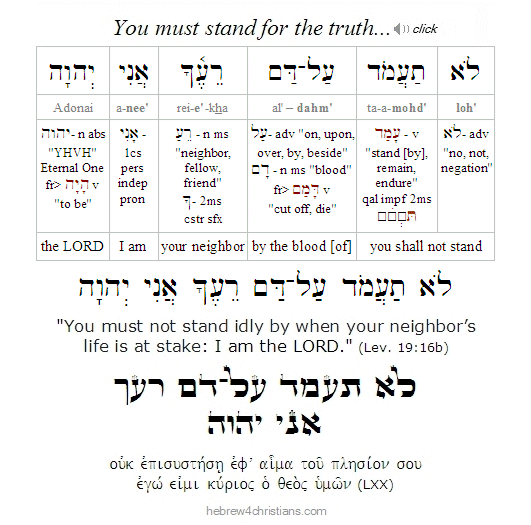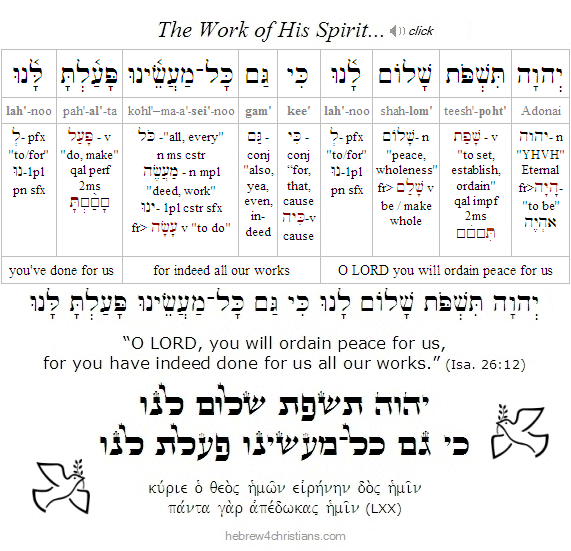|
We are living in stressful times, friends. The world is drunk with its delusions and truth has fallen in the streets... Outrage and rank stupidity are dark motifs of our moribund and cowardly culture. The Apostle Paul wrote that the time before the "End of Days" would be "perilous" (χαλεπός) and full of unrelenting human depravity (2 Tim. 3:1-5). Yeshua warned that apostasy would abound and that the hearts of many would run cold as ice (Matt. 24:12). In light of the raging spiritual war going on all around us, the following needs to be emphatically restated: "The important thing is to not lose your mind..."
The mind is the "gateway" to your heart, and it is therefore essential to guard your thinking by immersing yourself in the truth... Fear is often the result of believing the lie that God is not in control or is unable/unwilling to help you... "Not losing your mind" therefore means being grounded in what is real, and it therefore means understanding your identity and provision as a child of God. "God has not given us the spirit of fear, but of power (גְּבוּרָה / δύναμις) and of love (ἀγάπη), and of a "sound mind" (σωφρονισμός), lit. a "delivered" mind, "healed" from fragmentation (2 Tim. 1:7). The Greek word "sound mind" (σωφρονισμός) comes from the verb sodzo (σῴζω), meaning "to save," from saos (σάος) "safe," in the sense of being under restraining influence of the Spirit of God... The closest Hebrew word might be musar (מוּסָר), moral "discipline."
Part of the task of "guarding your mind" is being able to discern between good and evil. "The fear of the LORD is to hate evil (יִרְאַת יְהוָה שְׂנאת רָע); I hate arrogant pride and the evil way and perverse utterances" (Prov. 8:13). As Amos cried out, "Hate what is wrong, love what is right." We are called to love the truth and abhor the lie. Tolerating sin in a world ripe for judgment is a tacit form of "collaboration" with the enemy... Indeed, the only thing regarded as intolerable in the devil's world is the objection that people have a supposed "liberty" to sin. But the LORD is clear on this point: "Those who call evil good and good evil are as good as dead, who turn darkness into light and light into darkness, who turn bitter into sweet and sweet into bitter. Those who think they are wise in their own sight are as good as dead, those who think they possess understanding" (Isa. 5:20-21).
Our Torah portion this week includes the statement, Lo ta'amod al dam re'ekha: "You must not stand idly by when your neighbor's life is at stake" (Lev. 19:16). The principle of lo ta'amod (לא תַעֲמד) means that we have a moral duty to speak the truth when others are victimized. "Standing idly by" can therefore mean refusing to come forward with the truth about a situation from fear of the consequences, but it can also mean excusing the sin of our culture and of our friends. "A truthful witness (עֵד אֱמֶת) rescues lives, but the one who breathes lies (יָפִחַ כְּזָבִים) brings deception" (Prov. 14:25). As it is written, "You shall not spread a false report. You shall not join hands with a wicked man to be a malicious witness (עֵד חָמָס)" (Exod. 23:1). It is the truth that sets people free to serve God, but this presupposes the ability to discern how we all become enslaved to deception. "You are to distinguish between the holy (i.e., ha-kadosh: הַקּדֶשׁ) and the common (i.e., ha-chol: הַחל), and between the unclean (i.e., ha-tamei: הַטָּמֵא) and the clean (i.e., ha-tahor: הַטָּהוֹר)" (Lev. 10:10, see also Ezek. 44:23). Just as God separated the light from the darkness (Gen. 1:4), so we are called to discern between (בֵּין) the realms of the holy and the profane, the sacred and the common, and the clean and the unclean. Indeed, the Torah states "God called the light Day, and the darkness he called night," thereby associating His Name with the light but not with the darkness (Gen. 1:5). "For you all are sons of the light and sons of the day. We are not of the night nor of the darkness" (1 Thess. 5:5). We are instructed therefore to wear the "armor of light" (Rom. 13:12) and to be equipped to wage spiritual warfare in God's Name (Eph. 6:11-18).
Yeshua testified before the godless rulers of this world: "For this reason I was born, and for this reason I came into the world - to testify to the truth. Everyone who belongs to the truth listens to my voice" (John 18:38). The people of God are the people of truth!
Hebrew Lesson:
 |
We have a moral duty to (humbly) correct others or to confront them about their sins. We must warn others that they too will one day stand before God in judgment of their lives. The Hebrew word tokhechah (תּוֹכֵחָה) means "reproof" and is connected with love. We are to judge with righteousness, using a "good eye" (ayin tovah) and always extend the hand of merit (kaf zechut). As it is written, "Do not hate your brother in your heart, but rebuke your neighbor frankly, so that you won't carry sin because of him" (Lev. 19:17). One of the most unloving things you can do to another person is to wink at their sin or to disregard their high calling before God... A good friend will hold your "feet to the fire" and help you stay honest with yourself... He or she will encourage you to "press on" to realize your true identity as God's child. As it is written in Proverbs: "One who rebukes a person shall in the end find more favor than the one who flatters with words" (Prov. 28:23). Tokhechot may be likened to a good Father's moral correction of a son that leads to life (Prov. 6:23). "My son, do not regard lightly the discipline (musar) of the Lord, nor be weary at his rebuke (tokhechot). For the Lord disciplines the one he loves, and chastises every son whom he receives" (Heb. 12:5-6; Prov. 3:11-12).
We have to be careful about all this, of course, and ask God for great wisdom whenever we seek to offer correction to others. For example, when Nathan the prophet went to King David to confront him about his sin with Bathsheba, he told David the story of the poor man who was robbed of the only lamb he had by a rich man. David was outraged and ordered the perpetrator to be put to death. Only after David had pronounced judgment on the offender did Nathan reveal his parable: Attah ha-ish! "You are that man!" (2 Sam. 12:7). As the Baal Shem Tov remarked, God proceeds similarly with anyone due to be punished for a transgression - by retelling the story of his or her sin in a slightly disguised form, as if it had been committed by someone else. When the person condemns the fictitious sinner, he therefore comes to terms with his own sinfulness and culpability... Therefore we are instructed to judge others with awareness of our own frailty and with kaf zechut - the benefit of doubt extended toward the other person. As Yeshua reminded us, "Do not judge by appearances," but "be'tzedek tishpot amitekha" (בְּצֶדֶק תִּשְׁפּט עֲמִיתֶךָ), in righteousness judge your neighbor (John 7:24, Lev. 19:14). We all have a proverbial "log" in our own eye whenever we attempt to remove the "speck" we see in someone else's (Luke 6:42)... Using an "indirect method" method of communication requires a good deal of wisdom, however, and in general it is a good to refrain from a direct form of rebuke, unless the other person truly understands that you value and care for them. Above all it must be remembered that it is the role of the Holy Spirit to convict the heart of sin (John 16:18).
Another aspect regarding this topic is confession... "Confess your sins to one another and pray for one another so that you may be healed" (James 5:16). "We are only as sick as the secrets we keep," and yet confiding in another by disclosing our sins and struggles makes us vulnerable. In order to be "corrected" by a friend, we have to trust that we will be accepted... And we have to be honest -- first with ourselves, and then with the trusted other. As Margary Williams wrote in the Velveteen Rabbit: "Generally, by the time you are Real, most of your hair has been loved off, and your eyes drop out and you get loose in the joints and very shabby. But these things don't matter at all, because once you are Real you can't be ugly, except to people who don't understand." It is in this context that correction can be lovingly offered, while there is a shared sense of brokenness and genuine love. Simply "rebuking" others rarely does any good...
Notice that the great commandment to love your neighbor "kamocha" (as yourself) is given in connection with forgiveness. Leviticus 19:18 reads, Lo tikom, v'lo titor (לא־תִקּם וְלא־תִטּר): "You must not take vengeance nor bear a grudge ... but you must love your neighbor as yourself. I am the LORD." As an aside, let rhetorically me ask why the oft-repeated phrase, "I am the LORD" appears after so many of the Torah's commandments (i.e., "You shall do x... I am the LORD")? The sages reply, to remind us that God sees everything and nothing is hidden from His eyes... God knows our heart, chaverim, and perfectly understands our inner intentions. Yeshua, the Word of the LORD, is "sharper than any double-edged sword, piercing even to the point of dividing soul from spirit, and joints from marrow; it is able to judge the desires and thoughts of the heart" (Heb. 4:12).
In light of the madness and depravity of this evil world, it is essential to remember that God is in complete control of all things. He works "all things together for good" to those who are trusting in Him. And "there is no fear in love" (אין פַּחַד בָּאַהֲבָה), especially since we know that ein od milvado (אֵין עוֹד מִלְבַדּו) -- there is no real power apart from the LORD (i.e., He is the only true Power in the universe, despite the menace and threats that mankind routinely inflict upon one another). Indeed, our King the Messiah Yeshua is called Elyon lemalkhei-aretz (עֶלְיוֹן לְמַלְכֵי־אָרֶץ) - the "Ruler of the princes of the earth" (Rev. 1:5) - and that means they ultimately will answer to Him. Despite the madness and schemes of this world, we know that the LORD God Almighty reigns, and therefore we need not be afraid of man or his devices. The call to holiness is a call to act counter culturally -- call upon the Name of the LORD and walk in faith, chaverim!
A Closing Thought: Ultimately the problem we have with "holiness" is that we are decidedly unholy people. This is similar to the idea that the Law is "holy, just, and good," but we are "sold into slavery to sin" (Rom. 7:12-14). But thank God for our Savior Yeshua, who graciously imparts holiness to us and sets us free from the vain attempt to please God through the principle of "self-effort" (1 Cor. 1:30; Titus 3:5; Rom. 8:1-2)! Because of Him, we do not work toward a place of victory, but rather from the place of His victory (1 Cor. 15:57)! Our LORD Yeshua -- the Killer of death; the Slayer of the Serpent; the final Victory of God's awesome love for us! יְהִי שֵׁם יְהוָה מְברָךְ - "Blessed be the Name of the Lord."
 |
|




